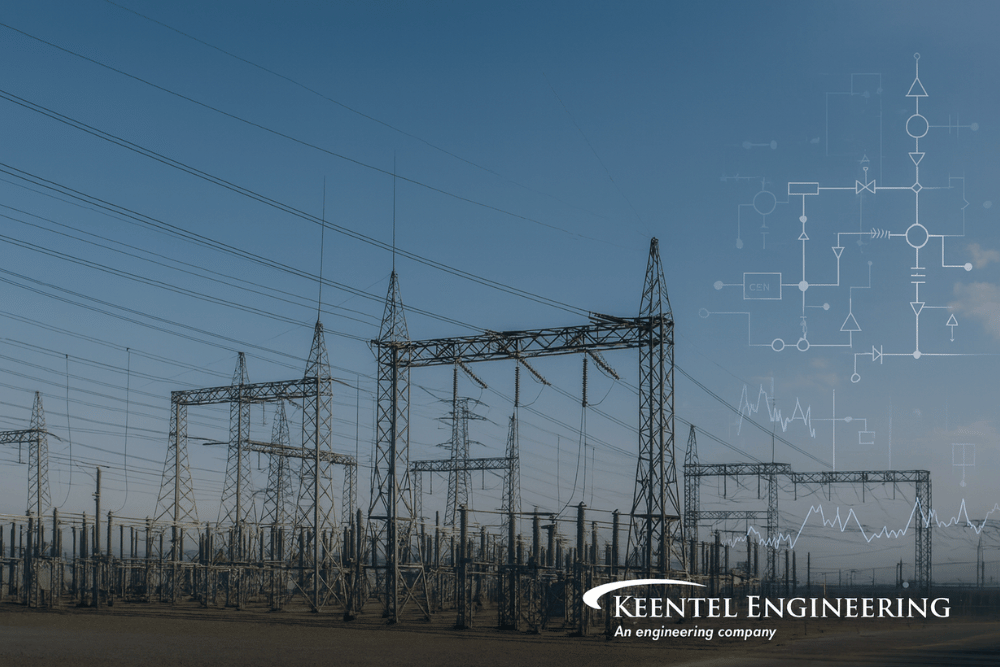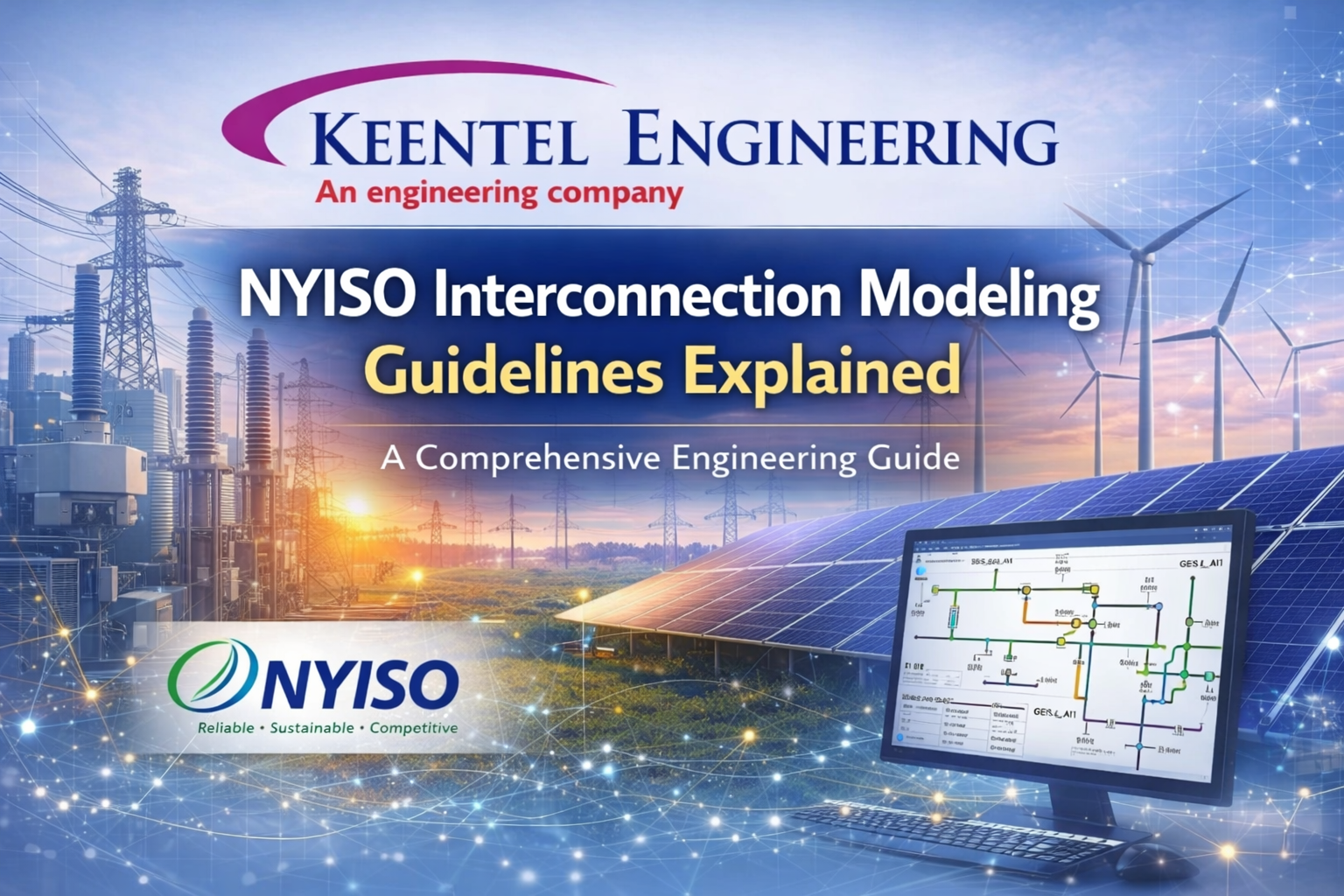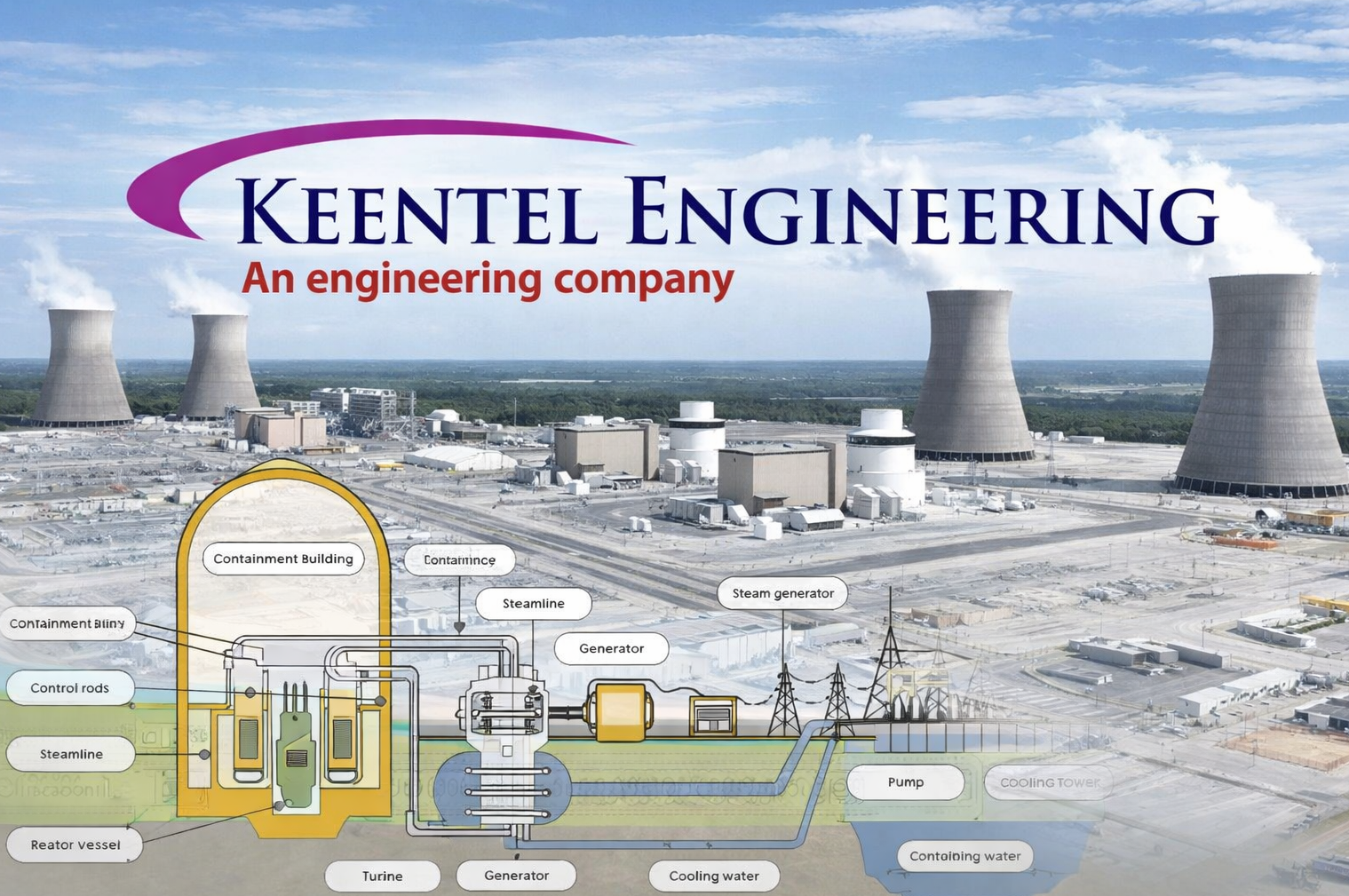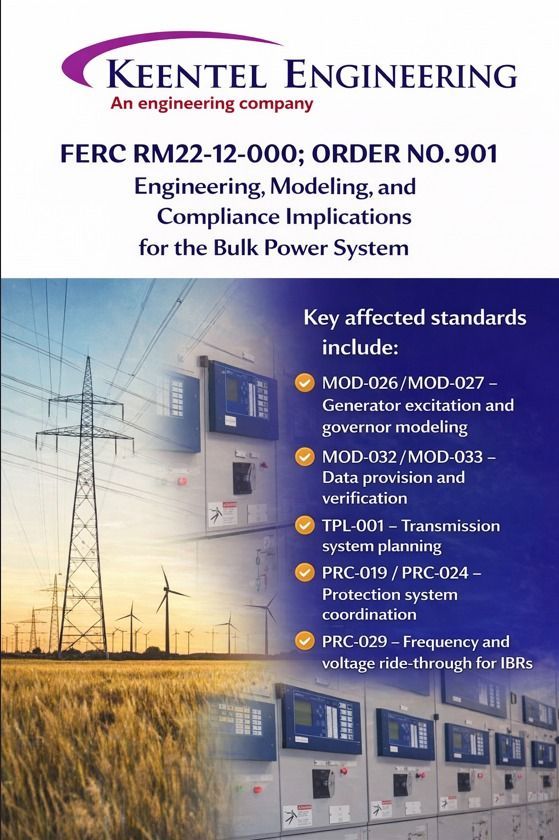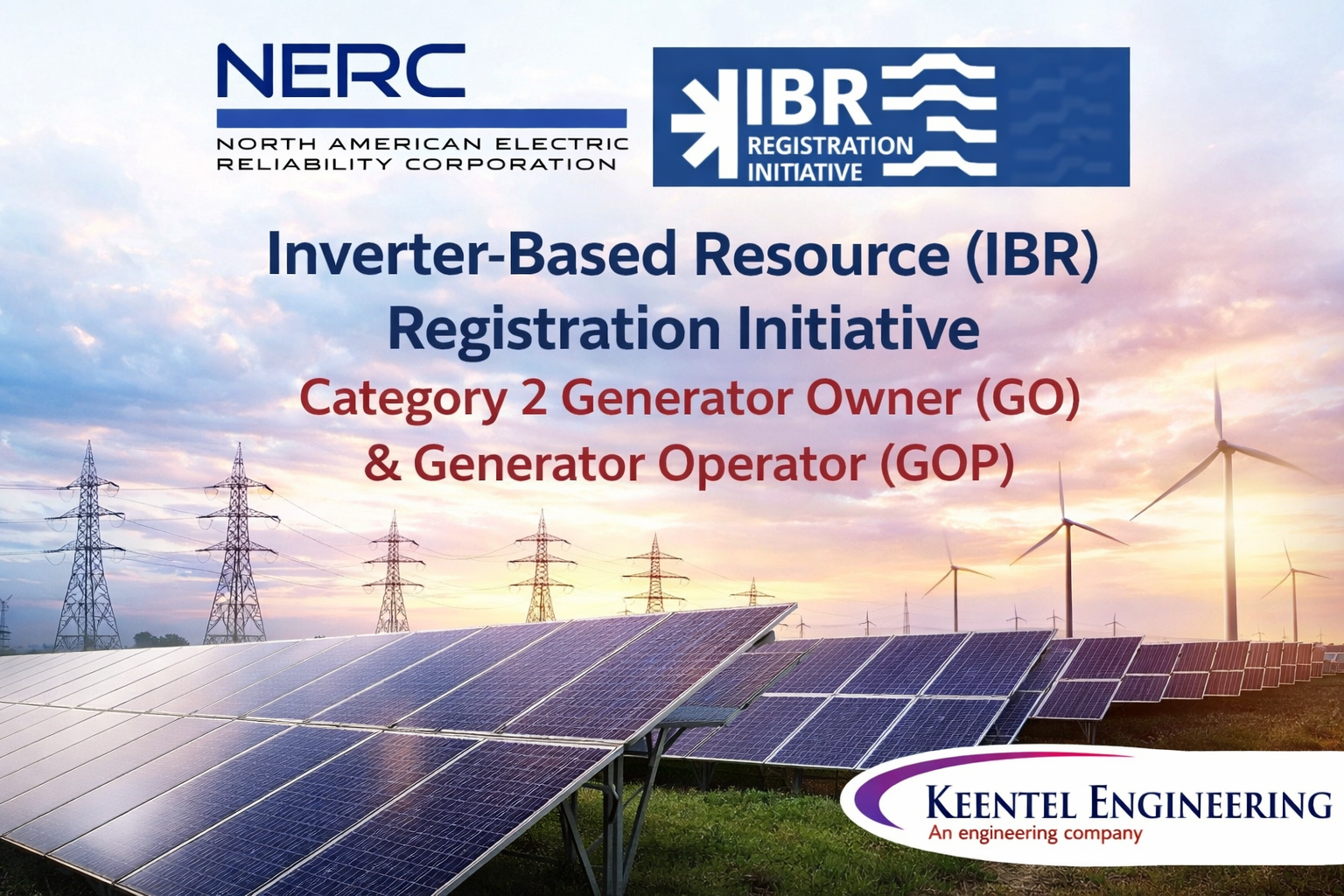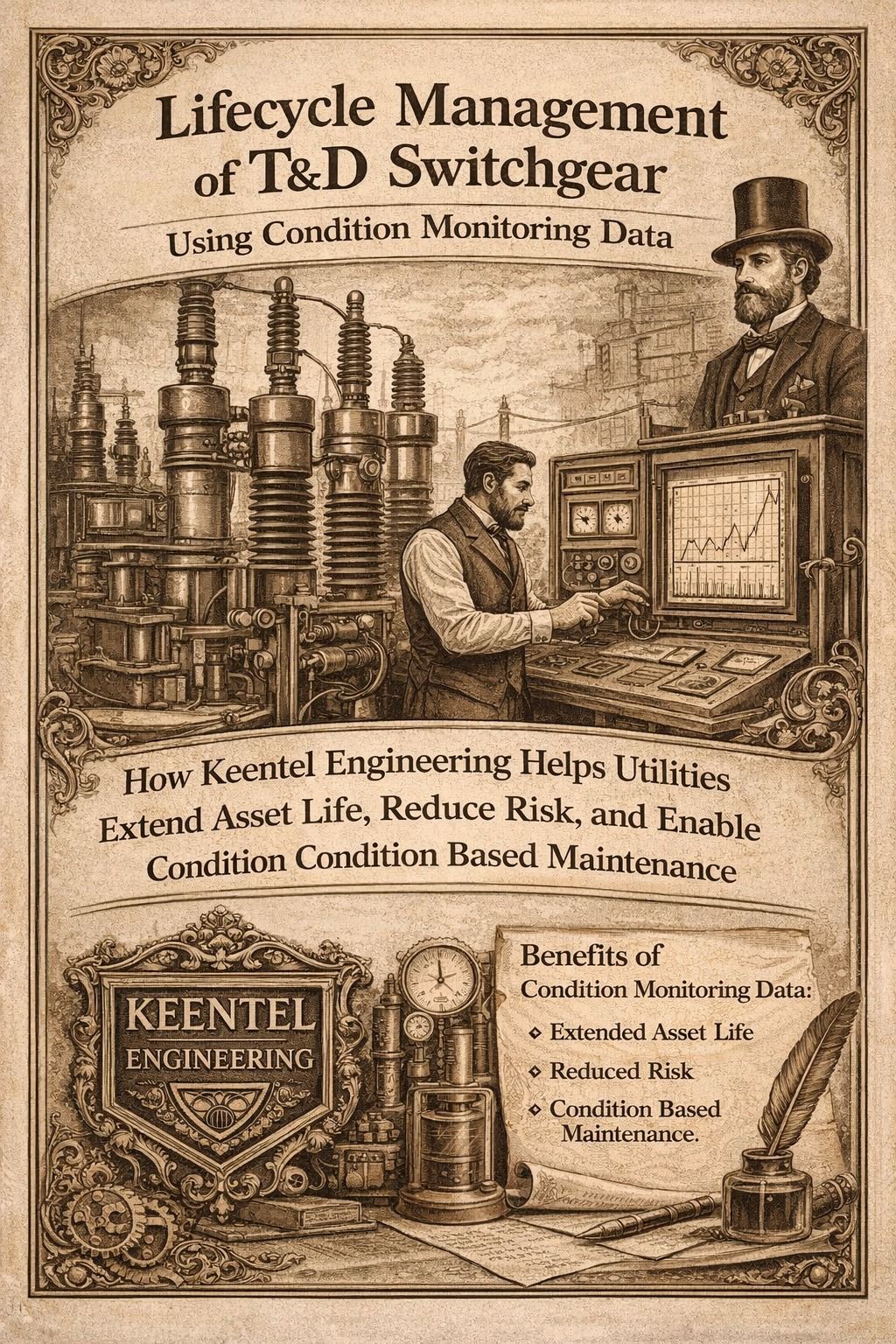A Coordinated Electric System Interconnection Review—the utility’s deep-dive on technical and cost impacts of your project.
Challenge: Frequent false tripping using conventional electromechanical relays
Solution: SEL-487E integration with multi-terminal differential protection and dynamic inrush restraint
Result: 90% reduction in false trips, saving over $250,000 in downtime
Electromagnetic Transient (EMT) Analysis for Modern Power Systems
September 13, 2025 | Blog
Introduction
As modern power systems become increasingly complex—with renewable energy integration, advanced control systems, and new reliability standards—the need for precise and reliable Electromagnetic Transient (EMT) Studies has never been greater.
This article explores the importance of EMT studies, their applications, and how KEENTEL’s expertise and tools are shaping the future of grid reliability, renewable integration, and power system resilience.
Why EMT Studies Are Essential
EMT studies focus on analyzing the dynamic electrical behavior of power systems under fast, transient conditions. Unlike steady-state analysis, EMT simulations capture rapid events such as lightning strikes, switching surges, and inverter-based resource interactions. These studies ensure:
- Equipment protection against over-voltages and surges.
- Grid stability under renewable penetration.
- Compliance with grid codes and international standards.
- Resilience during black start and emergency restoration events.
Learn about:
Power system modeling services
Applicability
MOD-033-1 applies to:
- Planning Coordinators (responsible for overseeing planning areas),
- Reliability Coordinators, and
- Transmission Operators.
These entities must collaborate to ensure the accuracy of power flow and dynamics models across interconnected transmission systems mod-033-1.
Key Capabilities of KEENTEL in EMT Studies
KEENTEL offers a comprehensive range of EMT study services
- Insulation Coordination – Evaluating switching, lightning, and temporary over-voltages.
- Breaker Transient Recovery Voltage (TRV) – Ensuring circuit breakers withstand fast recovery stresses.
- Very Fast Transients (VFT) – Studying switching surges in Gas-Insulated Switchgear (GIS).
- Custom Model Development – Tailoring simulations to specific client needs.
- Power Quality Studies – Including harmonics, flicker, and capacitor switching.
- Renewable Integration – Assessing solar and wind interconnection feasibility.
- Advanced Controls – Analyzing sub-synchronous resonance and HVDC/FACTS device interactions.
- System Restoration – Validating black start and fast bus transfer procedures.
- Training – Introductory to advanced PSCAD courses for engineers worldwide.
Real-World Applications: Case Studies
1. TRV and Insulation Coordination Studies
KEENTEL assessed transformer and equipment exposure to severe over-voltages, verifying protection adequacy and improving reliability.
2. Harmonic Resonance in a 100 MW Solar Plant (Texas, USA)
By identifying resonance risks caused by inverter-grid interactions, KEENTEL helped ensure seamless renewable integration without compromising power quality.
3. Black Start Studies (Australia’s NEM)
In collaboration with operators, KEENTEL validated System Restart Ancillary Services (SRAS) using EMT-based black start simulations, leading to optimized system restoration and reduced service requirements.
4. Sub-Synchronous Control Interaction (SSCI) in a 160 MW Solar Plant
KEENTEL applied advanced screening to identify potential inverter instabilities under sub-synchronous frequencies, ensuring grid code compliance.
5. Wind Integration for 400 MW Project
Through PSCAD simulations, KEENTEL recommended optimized control settings that allowed the wind farm to ride through faults and meet performance standards
Keentel’s Engagement Process
Keentel supports clients at every stage of project development, as outlined in the three-phase workflow (page 1 diagram):
- Stage 1 – Bid/Tender Evaluation & Data Preparation.
- Stage 2 – Model Testing, Validation & Simulation Runs.
- Stage 3 – Results Analysis, Recommendations & Implementation Plans.
This structured approach ensures transparent decision-making, practical solutions, and smooth project execution.
Conclusions
In today’s rapidly evolving power sector, EMT studies are not just optional—they are critical for safe, reliable, and future-ready power systems. KEENTEL’s decades of experience, coupled with PSCAD/EMTDC expertise, makes them a trusted partner for utilities, developers, and system operators worldwide.
Frequently Asked Questions – EMT Analysis
1. What is the purpose of Electromagnetic Transient (EMT) Studies?
They analyze fast-changing electrical phenomena such as lightning strikes, switching surges, and inverter interactions, ensuring equipment protection and grid stability.
2. Who benefits from EMT studies?
Utilities, renewable developers, system operators, equipment manufacturers, and large industrial power users.
3. How do EMT studies differ from steady-state studies?
Steady-state studies analyze long-term stable conditions, while EMT focuses on milliseconds to seconds of transient phenomena that could damage equipment or destabilize the grid.
4. What simulation platform does KEENTEL use?
KEENTEL developed and uses the world-renowned PSCAD™/EMTDC™ platform.
5. Can EMT studies help with renewable integration?
Yes, EMT studies identify harmonic resonance, sub-synchronous control interactions, and ride-through capabilities for wind and solar plants.
6. What are TRV studies?
Breaker Transient Recovery Voltage (TRV) studies ensure circuit breakers can withstand voltage stresses after interrupting faults.
7. What is Sub-Synchronous Control Interaction (SSCI)?
SSCI occurs when inverter controls in renewable plants interact with grid resonance at sub-synchronous frequencies, potentially causing instability.
8. How does KEENTEL support black start restoration?
By modeling weak grid conditions and verifying black start strategies with EMT simulations to ensure system recovery after outages.
9. Can KEENTEL develop custom models?
Yes, KEENTEL creates tailored models to simulate unique equipment, system configurations, or advanced controls.
10. How does EMT analysis support capacitor bank switching?
By simulating switching events, it helps prevent over-voltages, harmonics, and flicker issues.
11. Why are harmonics a concern in solar plants?
Inverter-grid interactions can cause resonance, leading to equipment overheating or malfunction without proper mitigation.
12. What industries use EMT studies the most?
Power utilities, renewable developers, transmission operators, and heavy industries.
13. How long does a typical EMT study take?
Timelines vary but usually follow the three-stage approach: preparation, validation, and analysis before implementation.
14. Does KEENTEL assist in regulatory compliance?
Yes, EMT studies help ensure compliance with grid codes and international standards.
15. Can EMT studies reduce costs?
Yes, by preventing equipment failure, optimizing protection settings, and reducing unnecessary services such as redundant black start contracts.
16. What is a Very Fast Transient (VFT)?
A type of high-frequency surge that occurs mainly in Gas-Insulated Switchgear (GIS), which EMT studies help mitigate.
17. Are EMT studies necessary for HVDC and FACTS projects?
Yes, they help assess dynamic interactions, resonance issues, and control stability.
18. What happens if discrepancies cannot be resolved locally?
They should be reported to the Electric Reliability Organization (ERO).
EMT Analysis in the Context of MOD-033-1
By combining traditional validation methods with advanced EMT analysis, stakeholders gain a clearer understanding of how their systems perform under both normal and extreme conditions. This not only ensures regulatory compliance but also reflects the true complexity of modern grid operations.
With decades of experience and expertise in PSCAD™/EMTDC™, KEENTEL Engineering equips clients with the modeling and validation support needed to future-proof transmission planning, protect assets, and ensure reliable integration of renewable energy resources.
👉 Explore how our
Power System Studies and
NERC Compliance Services support advanced EMT analysis.

About the Author:
Sonny Patel P.E. EC
IEEE Senior Member
In 1995, Sandip (Sonny) R. Patel earned his Electrical Engineering degree from the University of Illinois, specializing in Electrical Engineering . But degrees don’t build legacies—action does. For three decades, he’s been shaping the future of engineering, not just as a licensed Professional Engineer across multiple states (Florida, California, New York, West Virginia, and Minnesota), but as a doer. A builder. A leader. Not just an engineer. A Licensed Electrical Contractor in Florida with an Unlimited EC license. Not just an executive. The founder and CEO of KEENTEL LLC—where expertise meets execution. Three decades. Multiple states. Endless impact.
Services

Let's Discuss Your Project
Let's book a call to discuss your electrical engineering project that we can help you with.

About the Author:
Sonny Patel P.E. EC
IEEE Senior Member
In 1995, Sandip (Sonny) R. Patel earned his Electrical Engineering degree from the University of Illinois, specializing in Electrical Engineering . But degrees don’t build legacies—action does. For three decades, he’s been shaping the future of engineering, not just as a licensed Professional Engineer across multiple states (Florida, California, New York, West Virginia, and Minnesota), but as a doer. A builder. A leader. Not just an engineer. A Licensed Electrical Contractor in Florida with an Unlimited EC license. Not just an executive. The founder and CEO of KEENTEL LLC—where expertise meets execution. Three decades. Multiple states. Endless impact.
Leave a Comment
We will get back to you as soon as possible.
Please try again later.

